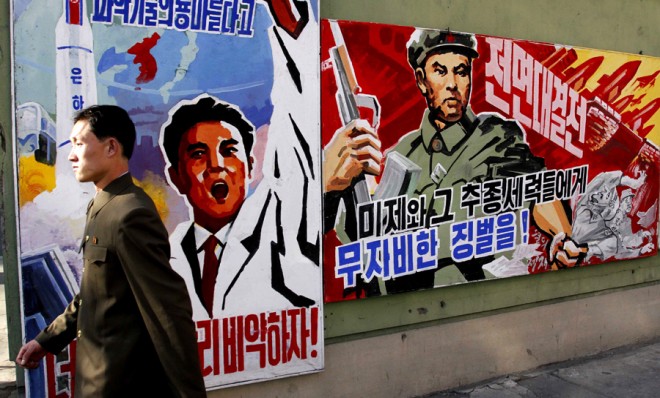What happens if North Korea collapses?
Pyongyang is threatening nuclear war. But that might not even be the worst-case scenario


A free daily email with the biggest news stories of the day – and the best features from TheWeek.com
You are now subscribed
Your newsletter sign-up was successful
North Korea shut down its last military hotline to South Korea last week, warning that nuclear war was imminent. The threat was the latest in a series of increasingly belligerent statements made by the Hermit Kingdom since world leaders imposed sanctions as punishment for the communist regime's recent missile and nuclear tests. Pyongyang has threatened to nuke both South Korea and the U.S.
On the bright side, security experts say North Korea doesn't have the ability to strike the U.S., and war on the Korean Peninsula is far from inevitable. "The North's wild gesticulations are unsettling," but "this is the seventh time Pyongyang has renounced the 1953 cease-fire" with the South, Doug Bandow points out at The American Spectator. "War has yet to erupt." One can't take anything for granted, but there's little reason to believe that North Korea's untested young leader, Kim Jong Un, "and those around him have turned suicidal after the death of his father."
North Korea is certainly dangerous, but as many experts point out, this is a war that the West would likely win. Perhaps that's why officials in Washington have been planning to confront "a more insidious threat: the untimely collapse of Kim Jong Un's government," says Geoffrey Ingersoll at Business Insider. This is the most closed-off country in the world. If its struggling regime finally collapses, our forces will have to dash over the 38th parallel blind to secure North Korea's nuclear stockpiles and long-range missiles in a rush that will make "the Pentagon's frenzied scramble looking for Iraq's WMD's look calm and orderly by comparison."
The Week
Escape your echo chamber. Get the facts behind the news, plus analysis from multiple perspectives.

Sign up for The Week's Free Newsletters
From our morning news briefing to a weekly Good News Newsletter, get the best of The Week delivered directly to your inbox.
From our morning news briefing to a weekly Good News Newsletter, get the best of The Week delivered directly to your inbox.
The Army has conducted war games to prepare, says James Joyner at Outside the Beltway, and it took 90,000 American troops 56 days to get into a dummy failed nuclear state and round up its nukes. If we ever do have to go into North Korea, "it would not be a cakewalk."
The trouble is, says Robert Taylor at PolicyMic, the "threats, sanctions, and dangerous, tax-guzzling war games off the Korean Peninsula" are costing the U.S. big-time, even if there's no war and the North Korean regime somehow manages to stay afloat. With President Obama's pivot to Asia, we're adding to billions to the fortune we've spent meddling in Korean affairs over the past several decades. In this time of sequester cuts, Taylor says, this kind of thing could be "disastrous to the fiscal state of America." As Dennis Rodman suggested, maybe the time has come for the U.S. to "try a little basketball diplomacy instead."
A free daily email with the biggest news stories of the day – and the best features from TheWeek.com
Harold Maass is a contributing editor at The Week. He has been writing for The Week since the 2001 debut of the U.S. print edition and served as editor of TheWeek.com when it launched in 2008. Harold started his career as a newspaper reporter in South Florida and Haiti. He has previously worked for a variety of news outlets, including The Miami Herald, ABC News and Fox News, and for several years wrote a daily roundup of financial news for The Week and Yahoo Finance.
-
 6 exquisite homes with vast acreage
6 exquisite homes with vast acreageFeature Featuring an off-the-grid contemporary home in New Mexico and lakefront farmhouse in Massachusetts
-
 Film reviews: ‘Wuthering Heights,’ ‘Good Luck, Have Fun, Don’t Die,’ and ‘Sirat’
Film reviews: ‘Wuthering Heights,’ ‘Good Luck, Have Fun, Don’t Die,’ and ‘Sirat’Feature An inconvenient love torments a would-be couple, a gonzo time traveler seeks to save humanity from AI, and a father’s desperate search goes deeply sideways
-
 Political cartoons for February 16
Political cartoons for February 16Cartoons Monday’s political cartoons include President's Day, a valentine from the Epstein files, and more
